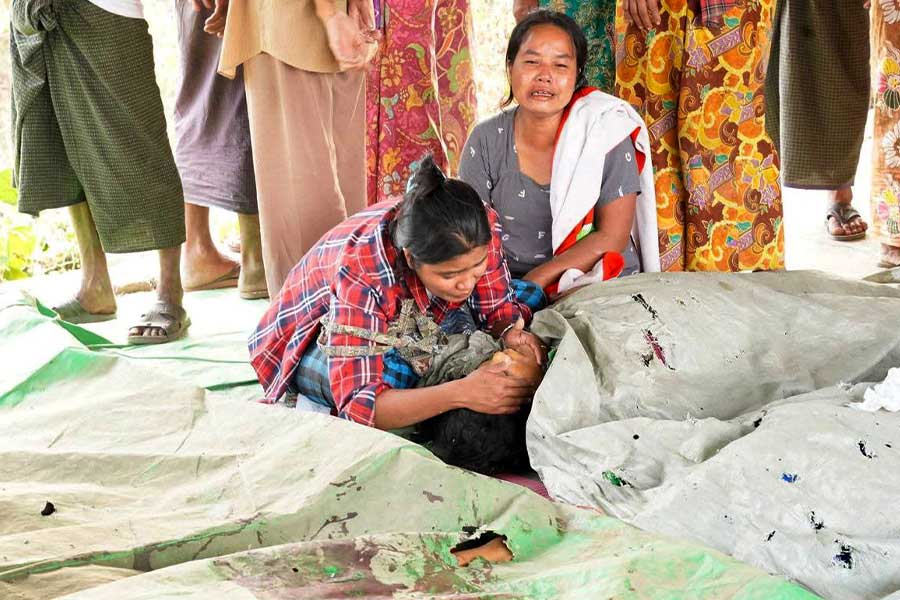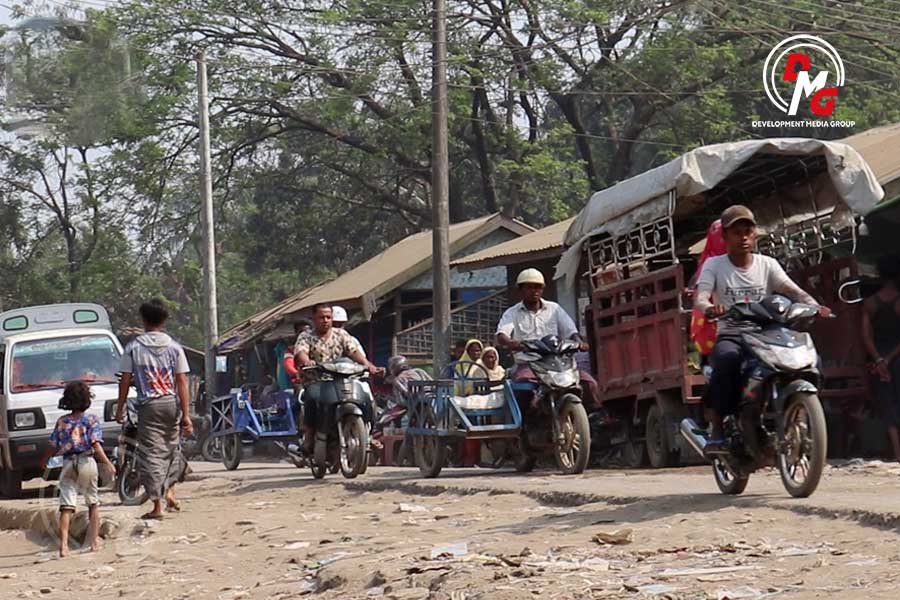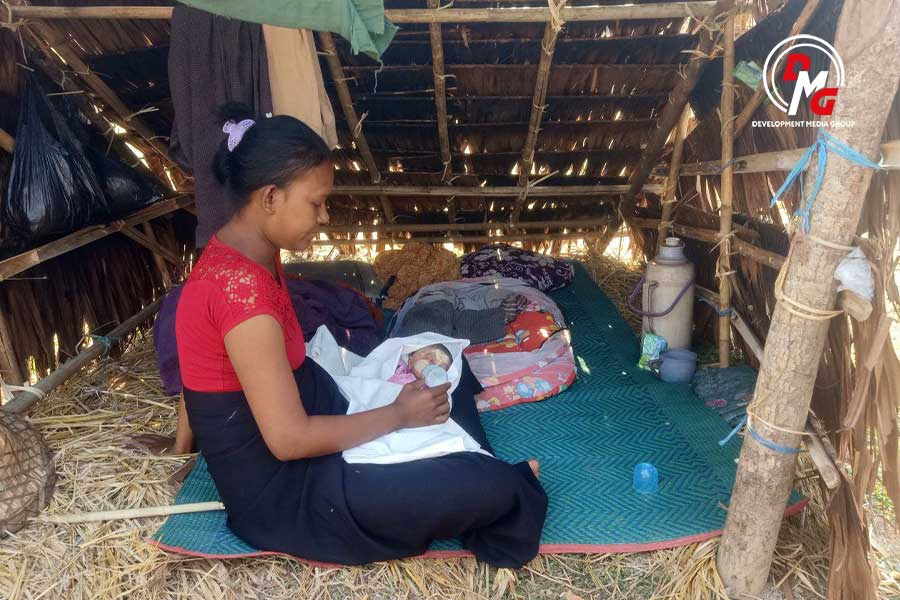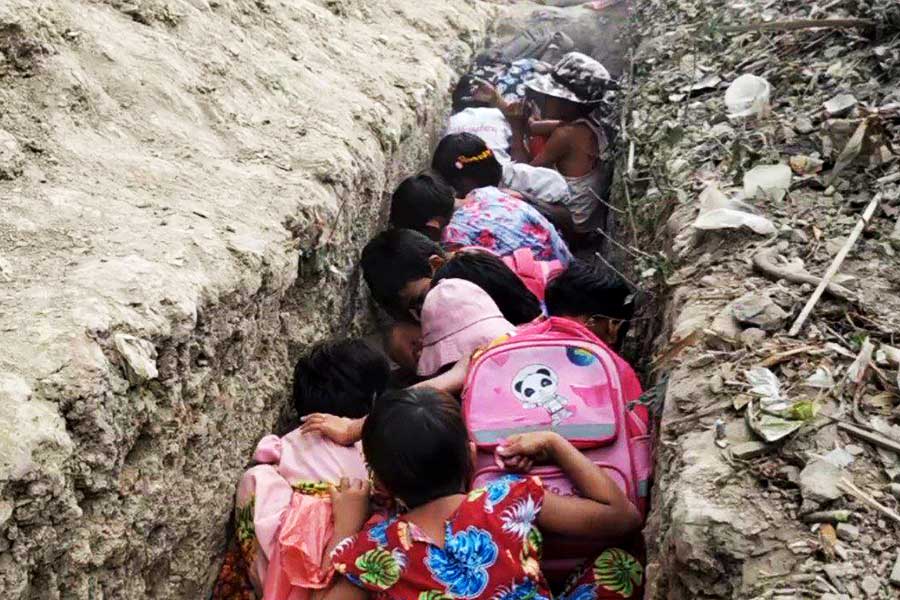- Arakan residents call for air raid warning systems amid surge in junta airstrikes
- Arakan’s Breathing Space (or) Mizoram–Arakan Trade and Business
- Death toll rises to 18 after junta airstrike on Ponnagyun village market
- Regime arrests dozens of Muslims in Sittwe over alleged Arakan Army links
- Over 200 IDPs in Ponnagyun struggle without shelter, food aid
Malaria resurges in Arakan State amid latest fighting
Although malaria cases in Arakan State have declined significantly since 2017 due to malaria control efforts, malaria has re-emerged since last year due to factors including climate change and military conflict, and the disease remains a significant concern.
06 Sep 2025
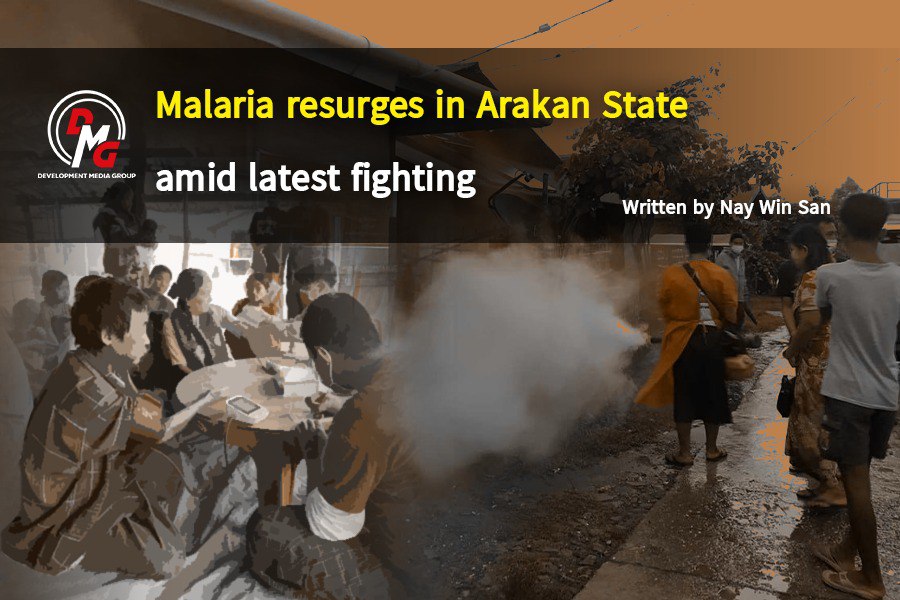
Written by Nay Win San
As the 59-year-old woman began to explain how her daughter died of malaria, tears began to flow from her eyes as she uttered her daughter's name.
"I didn't even get a single injection for my daughter when she was hospitalised. My daughter was admitted to the hospital at 7 a.m., but she died at 10 a.m.," said Daw Ma Win, who lives in a village in Kyauktaw Township, sobbing.
Daw Ma Win had four children, including 23-year-old Ma Soe Soe San, who died on June 3 from severe malaria.
"When my daughter was admitted to the hospital, she was screaming because she had a headache. When my daughter arrived at the hospital, the doctor examined her and found out that she had anemia. The doctor said that my daughter had a very severe case of malaria. My daughter's hands and feet were all pale," Daw Ma Win recalled of her daughter's experience at the hospital.
Although malaria cases in Arakan State have declined significantly since 2017 due to malaria control efforts, malaria has re-emerged since last year due to factors including climate change and military conflict, and the disease remains a significant concern.
Malaria thrives with onset of rainy season
During the early monsoon season this year, Daw Ma Win's daughters, Ma Khaing Phyo Nwe, 19, Ma Soe Soe San, 23, and Ma May Than Chay, 28, fell ill one after the other. Thinking it was a common cold, they bought medicine from a health worker in the village.
Despite taking medication, Ma Soe Soe San's condition worsened day by day, and when she was eventually taken to a nearby hospital, she was diagnosed with malaria.
"I told my daughter that if she gets sick, she will go to the clinic. She told me that she felt a little better. I couldn't afford to send her to the clinic. My husband is 65 years old, and he works as a farm labourer. I asked for money for his wages and took my daughter to the hospital," said Daw Ma Win.
Their family, who live in a village in Kyauktaw Township, work as labourers at a brick kiln and do odd jobs.
On the same day that Ma Soe Soe San died of malaria, Ma Khaing Phyo Nwe and Ma May Than Chay were also hospitalised. Ma Khaing Phyo Nwe was so ill that she lost consciousness, but survived because she arrived at the hospital in time.
"My other daughter was also very sick. People were surrounding her and trying to restrain her, but she was struggling, biting her tongue, biting her lips. The doctor gave her a series of injections and told her not to worry. She stayed in the hospital for a week before she was allowed to go home," said Daw Ma Win.
Malaria is common during the early and late rainy seasons, and requires proper sleeping arrangements with mosquito nets. Health officials say symptoms can appear within 10 days to four weeks after being bitten by a mosquito carrying the malaria parasite.
"If you have malaria and are taking medication and the fever is not controlled, the person may lose consciousness in about three days. In such a situation, you should go to the hospital. If you get treatment, you will feel better. If you don't get treatment, the malaria parasite can reach the brain and kill you," said Ma Moe New, a pharmacy shop owner in Kyauktaw Township.
Extreme weather and malaria
Arakan State, which borders the Bay of Bengal in western Myanmar, has been among the regions with the highest malaria incidence in the country.
Within Arakan State, the Tawphyarchaung area in Ponnagyun Township, the Upper Reach of the Saidin area in Buthidaung Township, the Phontharchaung area in Minbya Township and Ann Township are all areas that experience high malaria rates every year due to their dense forest cover and mountainous terrain.
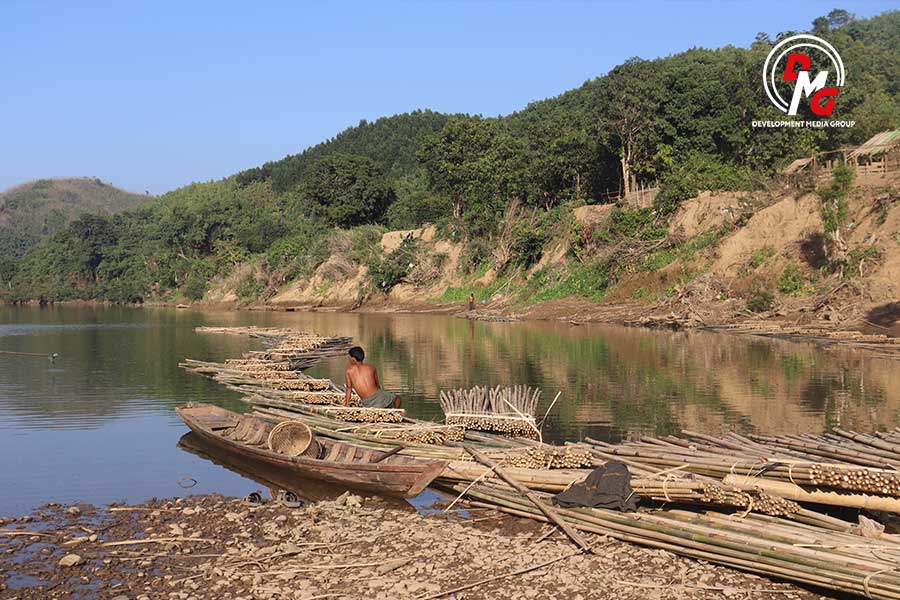
Following Cyclone Mocha, which hit Arakan State on May 14, 2023, malaria cases have re-emerged in some displacement camps in Kyauktaw and Ponnagyun townships.
According to the United Nations Office for the Coordination of Humanitarian Affairs (UN OCHA Myanmar), Cyclone Mocha affected 1.6 million people in Arakan State, Chin, Sagaing, Magway and Kachin.
Zifam Myanmar, a health knowledge sharing organisation, reported that there were 228,567 confirmed cases of malaria in Myanmar in 2023.
In Arakan State, malaria cases increased in 2024 from 2023, with at least 20 deaths. This included at least five in the Phontharchaung area in Minbya Township and five in the Tawphyarchaung area in Ponnagyun Township.
"If there are five people in a house, all five of them have malaria. Children have to go to hospitals and clinics for blood transfusions," said Daw Aye Sein Phyu from Pyinwa Village in the Phontharchaung area of Minbya Township, explaining how her family contracted malaria last year.
Daw Aye Sein Phyu and other locals believe that the malaria outbreak may be related to the floods, as people in the village began to suffer from malaria after the floods.
The Phontharchaung area in Minbya Township has seen a surge in malaria cases and deaths after floods inundated more than 20 villages in September 2024.
During the first monsoon of 2025, floods occurred in Ponnagyun, Kyauktaw, Mrauk-U, Minbya, and Taungup townships.
The village in Kyauktaw Township where Daw Ma Win and her family live, whose daughter died of malaria, also experiences annual floods, and in June this year the water level rose and flooded their basement.
"This is the fourth time we have had floods this year. When it floods, the water reaches the basement of our house. When I was going to take my daughter to the hospital, I couldn't go because the house was flooded, so I had to carry her on my shoulders," she said.
Temperatures and rainfall in coastal areas like Arakan State are increasing every decade, according to data from Myanmar's Department of Meteorology and Hydrology and NASA NEX GDDP.
According to the World Mosquito Program (WMP) website, extreme weather events such as extreme temperatures, droughts, floods, and heavy rainfall events increase the breeding and spread of mosquitoes.
The Arakan Army's Humanitarian and Development Coordination Office said on July 22 that 12,249 people, including 3,461 households in 90 villages in Arakan State, including displacement camps, were affected by flooding and required emergency assistance.
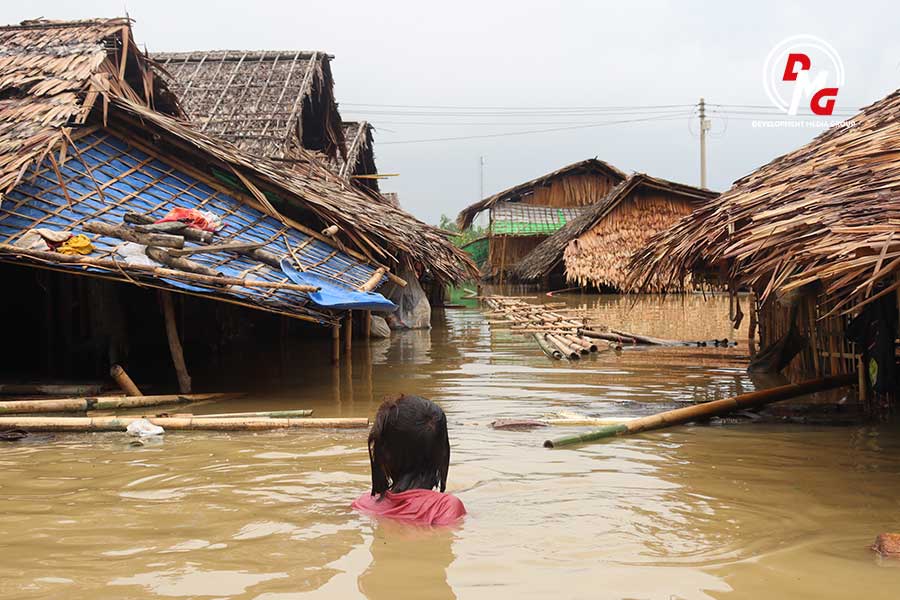
Malaria as consequence of military conflict
Fighting between the Myanmar military and the Arakan Army in Arakan State has been ongoing for more than a year.
Local people in Arakan State believe the increase in malaria cases is due to the long-term lack of human habitation, the increasing number of displaced people who rely on the forests for livelihoods, and the lack of access to healthcare.
Ma Hla Myint Aye, 30, who is sheltering in a displacement camp in Kyauktaw Township, has 12-year-old twin sons and a 6-year-old daughter. Ma Hla Myint Aye is worried that her children will contract malaria during this time of high mosquito breeding rates, due to the cramped living conditions in the displacement camp and the close proximity to the garbage area where refuse is dumped indiscriminately in the camp.
"The mosquito nets are old and we have to patch the holes and sleep in them. It is also inconvenient to buy mosquito nets. No one can afford a mosquito net for around K50,000," said Ma Hla Myint Aye.
It has been more than a year since Ma Hla Myint Aye's family fled fighting from Kyaytaw Paikseik Village in Sittwe Township to Kyauktaw Township. Ma Hla Myint Aye and her husband have been living in the displacement camp without receiving any assistance for about five months now, and they are struggling to make ends meet by working as cargo handlers, which does not provide them with a regular income.
"There is no mosquito repellent in the displacement camp, no mosquito nets. We want to take precautions. We need a clinic in the displacement camp," Ma Hla Myint Aye said.
The displacement camp where Ma Hla Myint Aye lives has over 330 households and 1,300 people, including more than 150 children under the age of 5 and over 40 breastfeeding mothers.
After more than a year of fighting, the Arakan Army has seized control of 14 townships in Arakan State, and fighting is also ongoing in Kyaukphyu and Sittwe townships.
During the battle for control of Taungup, local residents were forced to evacuate, resulting in high mosquito breeding in wells and ponds. When some residents returned to their homes, they were bitten by mosquitoes and contracted malaria, said Ko Saw (pseudonym), a local man in Taungup.
"There was a time when healthcare was weak. During the post-conflict period, there was no medicine, and even blood tests were difficult, so healthcare could not be provided. So we didn't know when malaria started, but this is one of the possible routes of malaria," he said.
He said that malaria, which had been absent in Taungup Township until 2017, re-emerged in force last year. The Arakan Army captured Taungup Township on December 14, 2024.
Ko Saw added that he had not heard of any deaths from malaria in Taungup Township, but that three people from Taungup Township who traveled to mainland Myanmar died of malaria in Yangon. He said the dead included a 27-year-old man, a man in his 40s, and an unknown person.
Unconfirmed reports also suggest that three young men died of malaria on a road crossing the Arakan Mountains from Taungup Township to mainland Myanmar in June.
The Arakan Army's Humanitarian and Development Coordination Office announced in January this year that the number of displaced people in Arakan State due to fighting has exceeded 600,000.
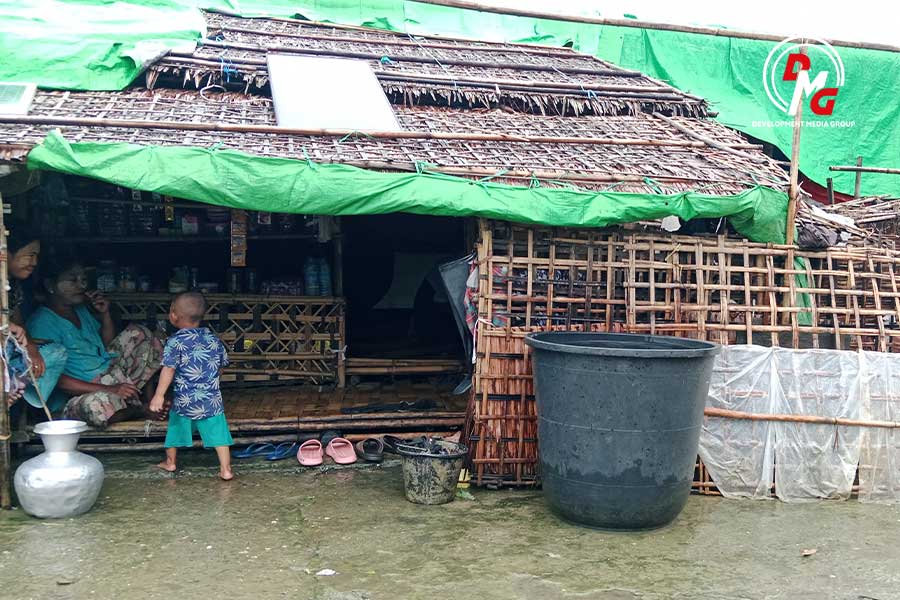
Locals said at least 15 people, including children and the elderly, died in June of this year due to a malaria outbreak in the displaced persons camps in Ann Township, which is occupied by the Arakan Army.
Ann Township is located close to the Arakan Mountains, and the incidence of malaria is increasing due to the lack of shelter and mosquito nets among displaced people.
"The number of malaria cases is increasing and the number of deaths is gradually increasing. The situation is likely to worsen during the rainy season due to the shortage of medicine and other difficulties," said a local man from Ann Township who did not want to be named.
The Arakan Army seized control of Ann Township on December 20, 2024, but residents are prohibited from entering due to the security situation. Ann Township is home to over 2,000 internally displaced people (IDPs).
Malaria resurges in Arakan State
Before the 2021 military coup, the state government's National Malaria Control Plan in Arakan State, in collaboration with international organisations such as WHO, JICA, USAID/PMI, MSF, and Malteser, had implemented a series of malaria prevention measures, resulting in a gradual decline in malaria cases.
The main focus was on Taungup, Ramree, and Manaung townships in southern Arakan State as pilot areas for malaria control, while Maungdaw, Buthidaung, and Rathedaung townships in northern Arakan State were also given attention.
Prior to the military coup, malaria control activities were mainly carried out in Taungup, Ramree, Manaung, Sittwe, Maungdaw, Buthidaung, and Rathedaung townships within Arakan State.
Malaria control teams implemented malaria control pilot projects, monitored malaria hotspots, collected data, analysed and reported, provided treatment through mobile clinics, conducted public awareness activities, and provided malaria testing and treatment.
After the coup, some organisations continued to work on malaria control, but due to military conflict, MSF had to indefinitely close 14 mobile clinics in Rathedaung, Buthidaung, and Maungdaw townships in northern Arakan State from June 2024, and malaria has resurged.
Malaria has been reported in Ponnagyun, Minbya, Kyauktaw, Rathedaung, Mrauk-U, Myebon, Taungup, and Ann townships during the monsoon season this year. From January to April, there were more than 400 cases of malaria, but three months later, by July, there were more than 1,000 cases, according to the Arakan Army's Department of Public Health.
In 2023 and 2024, malaria was reported in only a few villages in Ponnagyun, Minbya, and Kyauktaw townships, out of 14 townships in Arakan State now controlled by the Arakan Army, but this year, the number of townships affected by malaria has increased.
The number of deaths from malaria has also increased from about 20 in 2024 to more than 30 in 2025. The highest number of deaths from malaria this year was in Ann Township.
"On the ground, we see that malaria is more common among travellers to areas with low local transmission and high malaria prevalence, and among those who work in the jungle," said an official from the malaria control team under the Arakan Army's Department of Public Health.
Ko Kyaw Than, in his 30s, contracted malaria on his way home after traveling to buy goods from India, the only trade route for Arakan State.
Ko Kyaw Than has been buying and selling goods from India for a year and a half since 2024. During the rainy season this year, in June, Ko Kyaw Than began to suffer from malaria while in a village on the Myanmar-India border during a trip to buy goods.
The group of four traders, including Ko Kyaw Than, contracted malaria on their way back to Arakan State. Malaria has been a threat to traders who travel to India to buy goods during the monsoon season.
"There, you don't get to sleep under mosquito nets; you have to sleep wherever you can. If there are eatery shops, people have to sleep in rows in the shops. They [eatery shop owners] have built dormitories for sleeping, but there are also cases where five people have to sleep, where 10 people have to sleep," Ko Kyaw Than explained.
Since the end of 2023, the military regime has imposed road blockades and cut off the flow of goods to Arakan State, causing shortages and rising prices.
The United League of Arakan/Arakan Army (ULA/AA), which controls 14 townships in Arakan State, is not recognised as a legitimate government, making it difficult to legally trade with neighbouring countries.
With no other choice, Arakanese merchants are traveling to Mizoram, India, despite many challenges, to obtain essential food and medicine, and are struggling to meet local demand.
Many traders traveling to India during the monsoon season this year have been hit by malaria outbreaks due to the fact that traders from the Indian state of Mizoram have to stop in mountain villages along the way, sleeping in dormitories built for traders.
"Last year, we didn't hear about malaria as much, but this year, many people have malaria. Some people were sick and tested positive for malaria, while those who went to India were sick and tested positive for malaria," said Ko Kyaw Than.
Locals and the health community believe that the lack of easy access to malaria vaccines due to the military regime's road blockades since the start of the fighting in Arakan State has exacerbated the malaria outbreak.
A December 2024 World Health Organization report states that 38 million people (291 townships), or 70 percent of Myanmar's population, are at risk of malaria. Of these, 52 townships with the highest incidence are located in border areas where civil war is raging.
At a time when prevention and treatment efforts are critical due to the resurgence of malaria in Arakan State, USAID/PMI-supported malaria prevention and treatment partnerships in Arakan State were suspended in April 2025 due to the US government's cutoff of financial assistance.
As a result, organisations that provided preventive care and treatment have been unable to continue providing disease prevention and health education, as well as free medical treatment.
"The impacts are many. In the villages where the health project will be implemented, the villagers have lost key opportunities. In our office, about 20 staff have been laid off," said a woman from an NGO working to combat malaria in Kyauktaw Township, Arakan State, with support from USAID.
The cutoff of USAID support has led to a decline in volunteer systems, supplies, and data systems throughout Arakan State, including Taungup, Ramree, and Manaung townships, and increased outbreak risk.
NGOs working to combat malaria have warned that due to the current situation, malaria incidence rates could rise again to levels seen before 2015 in the next few years.
Combating the scourge
The Arakan Army's Department of Public Health is leading mosquito spraying and malaria prevention activities in some townships in Arakan State where malaria is prevalent.
Due to the suspension of military and financial support, some NGOs working on health issues in Arakan State have stopped their malaria prevention and control activities, and only the Arakan Army, which currently controls much of Arakan State, is carrying out some malaria prevention work.
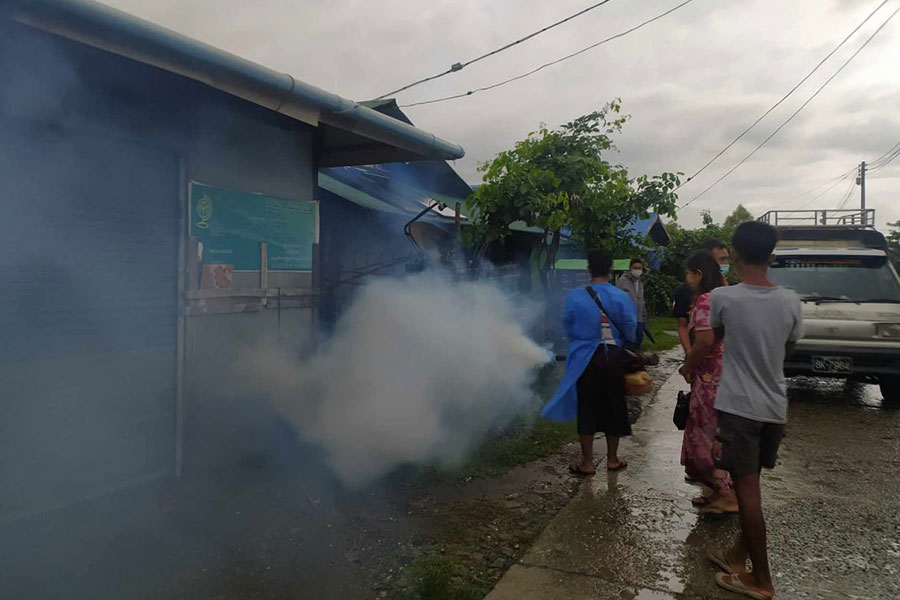
The Arakan Army's Department of Public Health is conducting field visits to malaria-prone villages to provide free medical treatment, training community-based malaria volunteers, providing anti-malarial supplies, and ensuring that there is no shortage of anti-malarial drugs in hospitals and clinics, said an official from the anti-malarial team.
"Under the global climate situation, and Myanmar's military and political situation, the malaria incidence rate is higher nationwide than in previous years. Therefore, in addition to providing timely medical treatment to those with malaria, we are also carrying out preventive measures to reduce the incidence of malaria and dengue fever," Arakan Army spokesman U Khaing Thukha said at an online press conference on August 11.
Locals say that displaced people in Ann Township have difficulty accessing medical care due to lack of physical access to healthcare facilities and financial difficulties.
"It is difficult for those who are sheltering in the forest to get there. Even [IDPs] suffering from malaria cannot access medical treatment," said a local resident of Ann.
The Arakkha people's government built a clinic in June this year to provide access to healthcare for displaced people and locals in Ann Township, where malaria incidence is high, but some are still unable to access it.
The Arakan Army's Department of Public Health is providing free healthcare to more than 300 people with malaria in Taungup Township, and more than 700 people from 14 villages have been tested for malaria.
A special advisor to the World Health Organization (WHO) told the media that Myanmar was still on track to eliminate malaria by 2030, based on the situation before the 2021 coup.
Currently, the incidence of malaria is accelerating, increasing sevenfold between 2021 and 2022, and it is now estimated that about 70 percent of Myanmar's population is at risk.
During the early monsoon season this year, when malaria was prevalent, Arakan State faced a shortage of malaria vaccines in urban markets, with the price of a single injection rising to more than K10,000.
Now, thanks to the influx of medicines from India, it is easy to buy malaria drugs. A pack of 10 oral pills for malaria costs K2,000 and an injection costs K6,000.
"In the early rainy season, there were not enough sales of anti-malarial drugs, but now there is a decline. The reason why anti-malarial drugs are not selling well is probably because we have access to anti-malarial drugs. I must say that we have felt relieved because anti-malarial drugs are coming in from India," said Ma Moe Nwe, a pharmacy owner in Kyauktaw Township.
Malaria is most common during the rainy season from June to August, and health experts have urged widespread efforts to prevent it by distributing insecticide-treated bed nets, making antimalarial drugs easily accessible, conducting mosquito control activities, and conducting health education campaigns.
Daw Ma Win, who saved the lives of her daughters who were suffering from severe malaria, is facing financial difficulties as she has to pay K500,000 for her land rental for the rainy season.
"My husband's wages were gone, and we didn't even have food left. The people in the village knew we were in debt, so they helped us a little bit," said Daw Ma Win.
Daw Ma Win, who misses her daughter Ma Soe Soe San profoundly, is also worried that her surviving daughters will contract malaria again.





